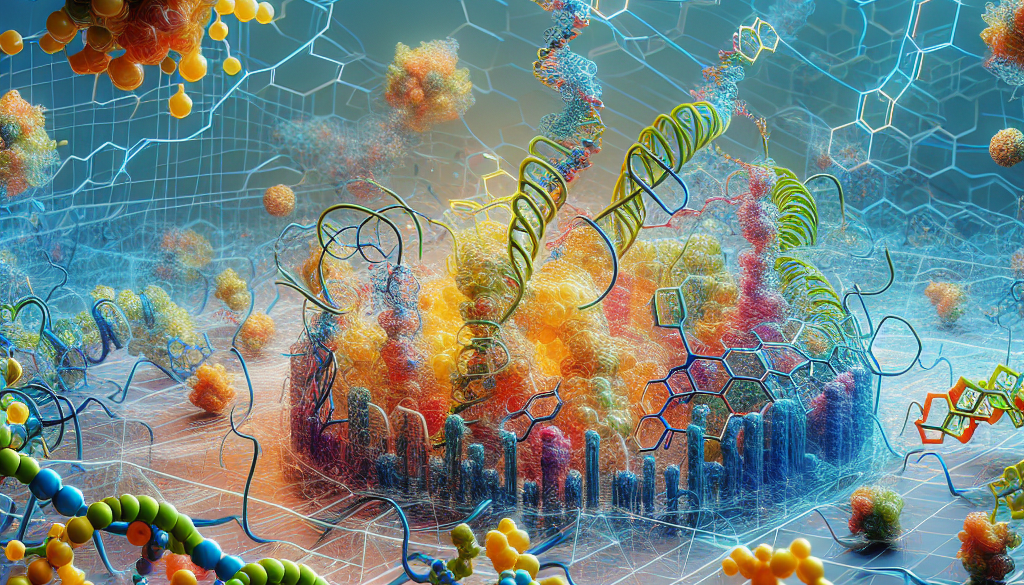Gelling Characteristics of Synthetic Proteins: New Frontiers
-
Table of Contents
- Synthetic Proteins and Gelling Characteristics: Exploring New Frontiers
- The Science Behind Protein Gelling
- Advancements in Synthetic Protein Design
- Applications of Synthetic Protein Gels
- Case Studies and Examples
- Challenges and Future Directions
- Statistical Insights
- Conclusion: The Potential of Synthetic Protein Gels
- Discover ETprotein’s High-Quality Protein Products
Synthetic Proteins and Gelling Characteristics: Exploring New Frontiers

The world of synthetic biology and protein engineering has opened up a plethora of possibilities in various fields, from biomedicine to food technology. Synthetic proteins, designed and produced in the laboratory, are now being tailored to exhibit specific characteristics, including the ability to gel. Gelling agents are critical in numerous applications, providing texture, stability, and functionality to products. This article delves into the gelling characteristics of synthetic proteins, exploring the new frontiers they present.
The Science Behind Protein Gelling
Proteins are natural polymers composed of amino acids linked by peptide bonds. When these proteins undergo certain environmental changes, such as alterations in pH, temperature, or ionic strength, they can transition from a liquid to a gel state. This process, known as gelling or gelation, is crucial in various industries, including food production, pharmaceuticals, and biotechnology.
Advancements in Synthetic Protein Design
Recent advancements in synthetic biology have enabled scientists to design proteins with specific gelling properties. These synthetic proteins can be engineered to gel at desired temperatures or pH levels, making them highly versatile. The design process often involves the use of computational tools to predict protein folding and interactions, followed by laboratory synthesis and testing.
Applications of Synthetic Protein Gels
Synthetic protein gels have a wide range of applications:
- Biomedical Applications: In tissue engineering, synthetic protein gels can provide scaffolds that mimic the extracellular matrix, supporting cell growth and tissue regeneration.
- Food Industry: As gelling agents, synthetic proteins can improve the texture and stability of food products without altering their taste.
- Pharmaceuticals: Protein-based gels can be used for controlled drug delivery systems, allowing for sustained release of medication.
Case Studies and Examples
Several case studies highlight the potential of synthetic protein gels:
- A study on synthetic silk proteins demonstrated their ability to form gels that could be used in drug delivery and tissue engineering.
- Research on elastin-like polypeptides has shown that these synthetic proteins can form temperature-responsive gels, useful for various biomedical applications.
Challenges and Future Directions
While the potential of synthetic protein gels is vast, there are challenges to overcome, such as ensuring biocompatibility and fine-tuning the gelling properties for specific applications. Future research is likely to focus on developing more sophisticated design algorithms and exploring new sources of synthetic proteins.
Statistical Insights
Statistics show that the market for gelling agents is growing, with a significant portion attributed to protein-based gels. The demand for sustainable and customizable gelling agents is driving research and development in this area.
Conclusion: The Potential of Synthetic Protein Gels
Synthetic protein gels represent a new frontier in various industries, offering customizable and sustainable solutions. As research continues to advance, we can expect to see more innovative applications of these remarkable materials.
Discover ETprotein’s High-Quality Protein Products
If you’re looking for top-notch synthetic protein products, ETprotein is your go-to source. With a reputation for excellence, ETprotein offers a wide range of organic bulk vegan protein and plant proteins, including:
- Organic rice protein
- Clear rice protein
- Pea protein
- Clear pea protein
- Pumpkin seed protein
- Sunflower seed protein
- Mung bean protein
- Peanut protein
ETprotein’s offerings are characterized by their neutral taste, non-GMO, and allergen-free attributes, catering to a diverse range of industries. Whether you’re in the nutraceutical, pharmaceutical, cosmeceutical, veterinary, or food and beverage sector, ETprotein has the protein solutions you need.
About ETprotein:
ETprotein, a reputable protein Chinese factory manufacturer and supplier, is renowned for producing, stocking, exporting, and delivering the highest quality organic bulk vegan protein and plant proteins. They include Organic rice protein, clear rice protein, pea protein, clear pea protein, pumpkin seed protein, sunflower seed protein, mung bean protein, peanut protein etc. Their offerings, characterized by a neutral taste, non-GMO, allergen-free attributes, cater to a diverse range of industries. They serve nutraceutical, pharmaceutical, cosmeceutical, veterinary, as well as food and beverage finished product distributors, traders, and manufacturers across Europe, USA, Canada, Australia, Thailand, Japan, Korea, Brazil, and Chile, among others.
ETprotein specialization includes exporting and delivering tailor-made protein powder and finished nutritional supplements. Their extensive product range covers sectors like Food and Beverage, Sports Nutrition, Weight Management, Dietary Supplements, Health and Wellness Products, and Infant Formula, ensuring comprehensive solutions to meet all your protein needs.
As a trusted company by leading global food and beverage brands and Fortune 500 companies, ETprotein reinforces China’s reputation in the global arena. For more information or to sample their products, please contact them and email sales(at)ETprotein.com today.














